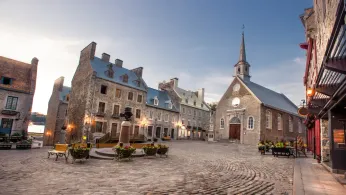
Jul 29
Churches in Once Catholic-Dominated Quebec Get New Secular Roles as Restaurants, Gyms and Theaters
Luis Andres Henao READ TIME: 4 MIN.
MONTREAL (AP) — On a Friday night, families danced under pink and purple neon lights to the beat of an African band playing where the altar used to stand at a Catholic church in Montreal.
Notre-Dame-du-Perpetuel-Secours, built between 1914-1920, was renovated and repurposed in 2014, becoming Theatre Paradox. The concert hall has hosted meditation, Zumba lessons, even a fetish party that organizers touted as “Montreal’s most kinky, freaky and sexy Halloween event.”
In the once Catholic-dominated province of Quebec, it’s just one of many churches that have been deconsecrated and transformed into everything from gyms, restaurants and museums to luxury apartments, auction houses and a university reading room.
For most of Quebec's history, the Catholic Church was the most powerful force in the French-speaking province, with a firm grip over schools, health care and politics. But its influence faded during the so-called Quiet Revolution of the 1960s, when the provincial government took control as part of a campaign to reduce the church’s power.
The rate of regular church attendance among Quebec’s Catholics plunged from one of the highest in Canada to the one of the lowest. That happened to Notre-Dame-du-Perpetuel-Secours.
Over the course of a century, thousands of worshippers filled its pews. But attendance had dwindled to a few when the event management company Groupe Paradoxe bought it in 2010, said its director, Gérald St-Georges. He believes that even in a deconsecrated secular setting, the former church continues what he describes as a sacred mission.
Today, it offers training and paid work for young adults, including those with prior addiction issues and juvenile records, in theater and stage management to help them land jobs in the entertainment industry.
“When I started the project, I said to myself, ‘That’s the kind of work the church should do, not only Mass,’” said St-Georges, who is a Catholic. “I practice my faith with what I do every day, helping people.”
Wood from the pews was used to build a bar. On a recent summer day, concertgoers ordered cold beers in front of stained glass illuminated by neon lights under a silver disco ball that hung from its soaring ceilings.
An opportunity to gather for believers and non-believers
In the historic neighborhood of Old Montreal, tourists formed a snaking line outside the Gothic-style Notre-Dame Basilica — Montreal's still-active mother church that also hosts secular events — to attend a popular show that uses projectors and lasers to illuminate the building.
Mateus Vassalo, a Brazilian tourist who visited the show with his family, said it's an incredible opportunity for believers and nonbelievers to gather in such a setting outside of worship services.
“You see people from other religions, Muslims, people who sometimes don’t even believe in God, coming here to the church,” he said in Portuguese.
“Even if they come specifically for the show, they end up having a contact, and who knows, maybe there’s a door for God to enter. There’s curiosity. There's questioning.”
Following Catholic values in a church turned restaurant
Just a few miles north, in the neighborhood of Hochelaga-Maisonneuve, the sky is dotted with crosses atop church steeples, many of them unused or repurposed.
For decades, factory and port workers worshipped at Saint-Mathias-Apotre Church. Today it’s a restaurant that serves affordable meals daily for up to 600 residents.
The manager of Le Chic Resto Pop also grew up Catholic and, like many of his staff, now identifies as religiously unaffiliated. But he still feels close to core values of Catholicism that he tries to extol at the nonprofit restaurant that keeps the original wooden doors and even the confessional booths.
“There's less faith, but the values are really much the same: It’s values of respect, values of well-being, of wanting to help each other,” Marc-André Simard said during a lunch break, sitting near what used to be the altar.
“There’s still space to be together, to have some sort of communion, but it’s around food, not around faith.”
“I vote for you!” Marie-Frédérik Gagnon, one of the restaurant employees, said laughingly next to him. She also grew up Catholic but is now part of the so-called “nones” — people who are religiously unaffiliated.
Today, she values how Quebec grants people the right to live free from religious impositions, while protecting the right to religious freedom.
“In the restaurant, we have a bunch of people that are Spanish-speakers, that come from African countries, and they’re still big believers, and everybody sits at the same tables. There’s a big acceptance of all.”
“It’s such a beautiful place,” she said. “People are very calm and quiet when they come here. The environment, all the lights, all the open space, I think it’s helping people to feel good. So it’s nice to have the chance to work in an open-space environment like this.”
___
Associated Press religion coverage receives support through the AP’s collaboration with The Conversation US, with funding from Lilly Endowment Inc. The AP is solely responsible for this content.






